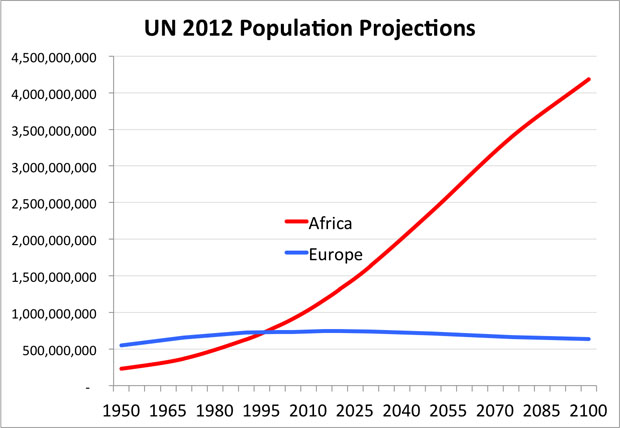The accompanying photo showed newcomers learning the fine points of shoveling snow at an eight-week class presented [...]]]>
The accompanying photo showed newcomers learning the fine points of shoveling snow at an eight-week class presented by the International Institute of Minnesota:

The article gives limited information about the Institute, noting that it has “resettled nearly 25,000 refugees in its centurylong history.”
However a glance at the internet shows that the nonprofit is expanding substantially:
As refugee debate intensifies, International Institute of Minnesota plans $12 million expansion, St. Paul Pioneer Press, January 13, 2020
ST. PAUL — At a time when nursing homes and assisted living facilities are scrambling to find employees who can balance a strong work ethic with sensitivity to the needs of vulnerable adults, Jane Graupman believes she has just the solution.
In a word? Refugees. She wants more of them, and she wants to make more room for them and other immigrants in her crowded classrooms. . . .
Meanwhile, technology has a different idea for patient care in nursing homes, namely robots, which are becoming smarter and more capable all the time. So America won’t be needing low-skilled foreigners for that job either.
One gets the impression that refugee resettlement can be a profitable endeavor. The most recent 990 report for the Institute available is for the year ending September 30, 2018, and it shows Executive Director Graupman getting a salary of $106,769. That’s probably decent money in Minnesota. Also interesting is that “government grants” from the taxpayers amounted to $2,294,910.
So uneducated, culturally ignorant immigrants and refugees can be quite enriching for diversity-seeking nonprofits.
]]>‘Life in Minnesota’ class: Shoveling, walking on ice and the nuances of ‘Nice’, Star Tribune, February 15, 2020
The eight-week cultural orientation class helps immigrants and temporary residents navigate myriad American systems — legal, education, health care — and more.
Dorcas Zirirane arrived at a “Life in Minnesota” class in St. Paul carrying her 1-year-old granddaughter on her back in a colorful cloth sling, speaking to her in Swahili. Zirirane was wearing a long skirt with a bold, vibrant pattern traditional to the Democratic Republic of Congo, from which she’d fled as a refugee.
But she’d already adapted her wardrobe to her new home. Zirirane raised the hem of her thin cotton skirt to reveal a pair of thick leggings.
Zirirane was one of about 20 students attending the International Institute of Minnesota’s eight-week cultural orientation class, which helps immigrants and temporary residents navigate myriad American systems — legal, education, health care — and more.
Instructor Sara Skinner also supplements the basic curriculum for refugees with skills specific to the state. Many are related to the cold: how to dress for winter, do the “penguin shuffle” when walking on ice, shovel snow correctly.
Others involve a more figurative cool: understanding Minnesotans’ reserve and interpreting the notorious “Minnesota Nice.”
This morning’s lesson was on health. Midway through it, Skinner stressed the importance of protecting your skin from the cold, dry air. “If you put Vaseline in your nose at night when you go to sleep that will help your nose not to bleed,” she offered.
The Swahili and Karenni interpreters did their best to translate a phrase that likely left those from warmer climes wondering what they were doing in this bone-chilling land of nasal-greasers.
Fear of freezing
The number of refugees coming to Minnesota has plummeted since President Donald Trump dramatically reduced the national cap on refugees (18,000 this year, down from 110,000 during Obama’s final year in office). Still, the state has a long tradition of welcoming newcomers and ranks high in its number of refugees resettled per capita.
Of the nearly 900 refugees who arrived in Minnesota in 2019, those from Myanmar were most numerous, followed by Democratic Republic of Congo and Ukraine. But a typical “Life in Minnesota” class includes students from countries all over the globe: China, Burundi, Rwanda and Portugal among them.
Helping new Americans achieve self-sufficiency remains a primary focus of the institute, which has resettled nearly 25,000 refugees in its centurylong history. It is one of five resettlement groups in the state. (Continues)
Also [...]]]>

Also concerning is the increasing number of African illegal aliens headed to the US — what’s wrong with Europe which is closer and easier to reach? One of the reasons President Trump included Nigeria has been the number of visitors who never leave.
In addition, the reactions range from extreme entitlement to something that sounds vaguely threatening. Following are remarks from a Nigerian government official:
Trump Administration Adds Six Countries to Travel Ban, New York Times, January 31, 2020
. . .Lai Mohammed, Nigeria’s Minister of Information and Culture, said Nigerian officials had not been advised their country would be included in the ban.
“It would be quite unfortunate if for any reason Nigeria were on the list,” Mr. Mohammed said, noting the two government’s cooperation in combating terrorism. “It would be a double jeopardy: The country has committed a lot of resources to fight terrorism. Any travel ban cannot but be inimical to the growth of the country.”
He added, “Once a travel ban is imposed on a country, the consequences are not always pleasant.” . . .
There was another article from the same day saying the “contentious” ban would cause “detachment from family members” — so do Nigerians expect to transplant the entire clan?
Nigerians in New York Worry Expanded Travel Ban Will Hurt Family Ties, New York Times, Jan 31, 2020
The Trump administration’s expansion of the nation’s contentious travel ban on Friday to include Nigeria, Africa’s most populous nation, and several other countries deeply rattled immigrants, leaving some Nigerians in New York worried that it would break family ties and have a negative effect on both countries.
“Africans have very strong family ties,” said Henry Ukazu, 35, of the Bronx, warning that not allowing people from Nigeria to come to the United States to live would result in negative consequences for both the United States and Nigeria.
Mr. Ukazu, who immigrated to the United States 10 years ago, predicted that the travel ban would bring about “a level of detachment from family members, and that is not a welcome development.”. . .
Monday’s Times front-paged a headline on the same topic: U.S. Ban Sunders Families and Slams Door on Much of Africa. Do we detect a pattern here?
Again, it’s the same complaint that America does not have open borders for the millions on earth — Nigerians in this case — who would like to live here.
New U.S. Travel Ban Shuts Door on Africa’s Biggest Economy, Nigeria, New York Times, February 2, 2020
The newlyweds had already been apart for half their yearlong marriage. Miriam Nwegbe was in Nigeria. Her husband was in Baltimore, and until she could join him, everything was on hold: finding a home together, trying for their first baby, becoming an American family.
Then, on Friday, their lives were thrown into disarray by the expansion of President Trump’s ban on immigration to include six new countries, including four in Africa. Nigeria, the continent’s most populous nation, was one of them.
“America has killed me,” Ms. Nwegbe’s husband, Ikenna, an optometrist, texted her when he heard. “We are finished.” . . .
Really? America is killing people just by trying to institute some long overdue immigration enforcement? Why doesn’t the Times address the real problems with extreme legal and illegal immigration instead of endless sob stories?
At this point, the world would be better off for everyone concerned to stay home and fix their own country.
]]>These days, Victimhood is a top value among the left, and their open-borders prescriptions are augmented with sob stories that proponents believe negate the routine [...]]]>
These days, Victimhood is a top value among the left, and their open-borders prescriptions are augmented with sob stories that proponents believe negate the routine illegal entering, job theft and welfare abuse that afflict more advanced nations today.
One example given is a man from Cameroon in the armpit of Africa who complains of violence at home because he is an English speaker. Funny, but next-door Nigeria is an English-speaking country, so he needn’t have travelled all the way to the United States to speak his language (and incidentally visit first-world welfare offices). Or he could have instead relocated to Europe, since invader routes are established.
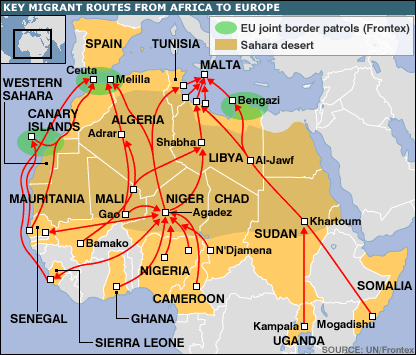
Ideally, this fellow should be deported ASAP to spread the word that America is a heartless place and unwelcoming to the increasing number of poor on earth who want to avoid the hard work of reform at home.
That would be a good message to send since illegal immigration from Africa is lately on the uptick.
Note that only one word in the article recognizes the lawbreaking of the supposed “migrant” characters — “unauthorized.”
]]>Letters from immigration detention centers, ‘break my heart every time I open an envelope,’ volunteers say, San Diego Union-Tribune, December 16, 2019
Volunteers and researchers have been collecting thousands of letters from people in immigration detention centers to show people the conditions of the men, women and children inside.
Decades from now, when historians try to make sense of how the U.S. government treated detained migrants, they will be able to hear directly from the men and women in federal immigration detention centers.
At least that’s the hope of Lisa Lamont, head librarian at San Diego State University who oversees a collection of more than 1,700 letters written by migrants in detention centers.
“In 20, 30 or 40 years or even longer down the road, when researchers are researching this time in U.S. history, I think these letter are going to be invaluable,” she said.
The population of people in Immigration and Customs Enforcement custody has grown significantly since the beginning of the Trump administration. During fiscal year 2015 there were 28,449 unauthorized immigrants in detention facilities. That number increased to 38,106 and 42,188 in the 2017 and 2018 fiscal years, respectively. Projections show that number is expected to increase to 52,000 by the 2020 fiscal year, according to data from the federal government.
The letters, mostly hand written on blank sheets of paper, detail poor conditions inside detention centers such as detainees being served rotten food, receiving poor medical treatment and harsh treatment by staff. Additionally, the letters shed light on current events driving migration to the United States.
For example, a letter from a 29-year-old Cameroonian national who has spent more than 15 months in detention describes violent conflicts between English-speaking Anglophones and the French-speaking population.
“I came here in U.S. seeking for protection because of what is happening in my country Cameroon because my country is a bilingual country where the English minority are been (sic) torture, kill, arrested and jail for a very long time or arrested and kill by the french government in Cameroon all because the Anglophone minority called southern Cameroon want secession from French Cameroon which cause many of my English Cameroonian to escape for their dear life,” he wrote.
According to his letter, the man could not be released from the detention center because he could not afford to pay a $50,000 bond. (Continues)
One seriously bad thing about African aliens is there’s a billion more where they came from.
Sunday’s Los Angeles Times had the usual sob [...]]]>
One seriously bad thing about African aliens is there’s a billion more where they came from.
Sunday’s Los Angeles Times had the usual sob story presentation on the front page with plenty of boo hooey stories of alleged suffering — so predictable.
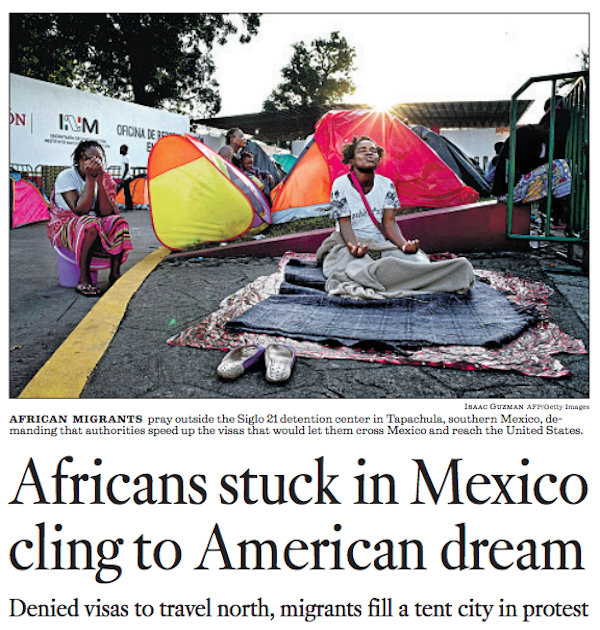
Here’s a snapshot from the story, showing a masked man with a cellphone, one of dozens protesting who “demand” visas to travel to the US.
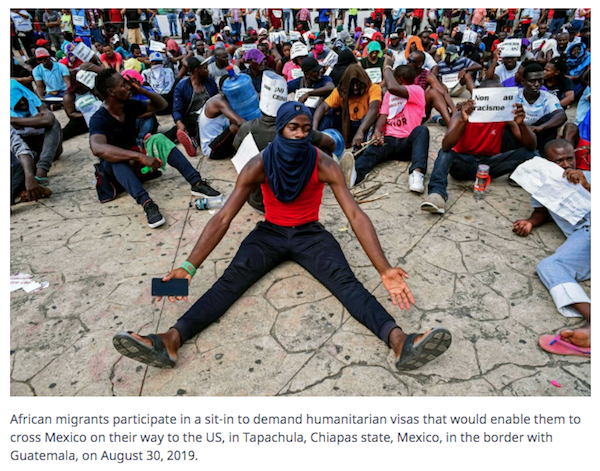
Why can’t they fix their own countries? The United States wasn’t created great — it took years of work to make it so. But aliens want to walk right in and get a full tray of freebies.
In the text below, note the “record 4,779 migrants from Africa” in the first seven months of 2019, a near quadrupling of the same period last year — this is not the direction we want.
America needs Zero foreigners from anywhere because smart machines will be doing much of the work very soon.
]]>African migrants stuck in southern Mexico, their American dream on hold, Los Angeles Times, September 22, 2018
“Africa weeps. Free us.”
That’s the message handwritten in French and Spanish on a protest banner at a tent city here in the southernmost tip of Mexico.
The tents belong to some 250 African nationals who crossed jungles, forded rivers, sneaked across borders and dodged militias and thieves to get here in hopes of eventually reaching the United States. But now they are stuck, because Mexico has denied them the travel visas necessary to proceed north.
Mexican national guard troops and riot police keep close watch over the multi-hued camp, where mosquitoes swarm in puddles. Rain and a fetid stream provide cooking water and many complain of rashes, stomach cramps and other ailments.
“We are fed up,” said Diop Abou, 33, a native of the northwest African nation of Mauritania. “None of us want to be here in this miserable place.”
In the saga of migrants trying to reach the United States, the dominant narrative of late features Central Americans, who account for the vast majority of the 100,000 foreigners whom Mexico has deported this year under pressure from the Trump administration to prevent them from reaching the U.S. border.
But Mexico’s effort to accommodate Washington — and avoid tariffs that Trump threatened to impose — has also targeted thousands of other foreigners, including more than 1,000 Africans who have amassed in southern Mexico over the last several months.
The tent city was erected in protest more than a month ago at the entrance of Tapachula’s federal immigrant detention center, which is called Siglo 21, or 21st Century.
The lockup is reserved primarily for people awaiting deportation, mostly Central Americans.
Mexican authorities apprehended a record 4,779 migrants from Africa in the first seven months of this year — nearly four times the number detained during the same period in 2018 — but deported only two.
The difficulty is that many African countries have no embassies or consular representatives here, and some of the migrants possess no verifiable identification. And so the majority remain stranded.
Those interviewed here said they fled violence, persecution and poverty, ethnic and religious strife and political repression back in their homelands. (Continues)
Thursday’s Sacramento Bee headlined the story on its front page with a rather frightening photo of a victim being buried by people totally swathed in protective clothing because Ebola is very contagious via bodily fluids:
It’s serious stuff, the [...]]]>
Thursday’s Sacramento Bee headlined the story on its front page with a rather frightening photo of a victim being buried by people totally swathed in protective clothing because Ebola is very contagious via bodily fluids:
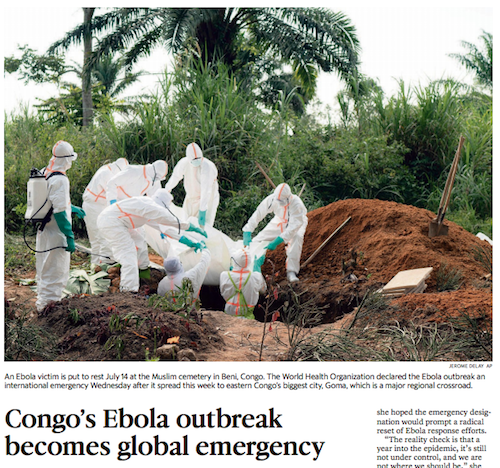
It’s serious stuff, the highest level of WHO alert, but curiously there is no national quarantine:
WHO says Ebola outbreak is an international health emergency, Washington Post, Jul 19, 2019
NAIROBI, Kenya – The World Health Organization took the rare step Wednesday of classifying an ongoing Ebola outbreak in eastern Congo as a “public health emergency of international concern,” just days after a first case of the virus was confirmed in the major city of Goma, on the border with Rwanda.
The last time the global health body declared an international emergency for Ebola was during the 2014-2016 outbreak in West Africa that killed more than 11,000 people. The designation means this outbreak qualifies for a higher level of global vigilance and mobilization to stem its spread.
Ebola began spreading in Congo’s conflict-ridden North Kivu province last summer and has infected more than 2,500 people and killed nearly 1,700, according to official Health Ministry figures. . . .
The declaration should not be used “as an excuse to impose trade or travel restrictions, which would have a negative impact on the response and on the lives and livelihoods of people in the region,” said Robert Steffen, chairman of the Emergency Committee.
Meanwhile, illegal alien Africans are now streaming through America’s open border. Fox News interviewed a young Camaroonian man in May who was apparently willing to spend a lot of money and travel thousands of miles to steal a “better life” in this country rather than work to build one at home:
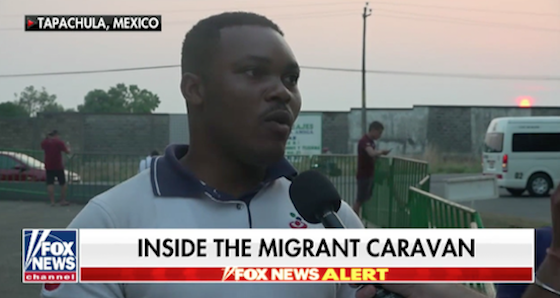
N.b: the population of Africa is now 1.3 billion persons.
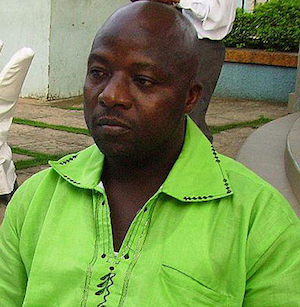 Open borders admit contagious disease as well as job-stealing aliens. One example was Ebola Tom (pictured) who traveled to the United States from Liberia in 2014 to mooch first-world healthcare as he knew he would receive in stupid-generous America. The nine days of medical treatment in a Dallas hospital cost $500,000, and he had no insurance.
Open borders admit contagious disease as well as job-stealing aliens. One example was Ebola Tom (pictured) who traveled to the United States from Liberia in 2014 to mooch first-world healthcare as he knew he would receive in stupid-generous America. The nine days of medical treatment in a Dallas hospital cost $500,000, and he had no insurance.
Unfortunately for America, there’s a fair amount of overlap between the Ebola outbreak regions and areas migrants are leaving.
It’s reported that African aliens are crossing the US border in “record numbers” — though the actual figures are a little sketchy and are sure to climb. Still, the Texas Monthly detailed that from June 4 — 18, around four hundred foreigners from Angola and Congo arrived in San Antonio; and the Border Patrol says it detained 740 Africans in the Del Rio sector in the first two weeks of June.
Unfortunately, too many American communities are welcoming the Africans and other aliens rather than treating them as invaders. As a result, the United States is increasingly seen as the World Welfare Office, rather than the home of the citizens.
]]>The current open border brings disease which endangers the people of the United States: some, like measles had been eradicated, and others, like Zika and [...]]]>

The current open border brings disease which endangers the people of the United States: some, like measles had been eradicated, and others, like Zika and Ebola, are entirely imported from abroad in recent years.
In one case, an eight-month pregnant Honduran “visiting” America gave birth to an anchor Zika baby whose lifetime healthcare cost to US taxpayers is estimated at $1-10 million.
Ebola is now having a flare-up in Africa just at a time when gaggles of Africans are crossing America’s open border along with the rest of the world. Five hundred Africans have arrived via that route since May 30. In 2014, a Liberian man with Ebola travelled here to receive first-world medicine despite the disease being extremely contagious. His nine days of care before death cost taxpayers $500,000.
So the public health threat from open borders is very real, getting worse and is not being widely discussed — although Tammy Bruce made a good case for more attention when she appeared with Tucker Carlson on Wednesday.
Spare audio:
]]>TUCKER CARLSON: While Republicans fuss about the details of Austrian economics and worry about tariffs, the U.S. border is getting closer and closer to total and utter collapse, and it’s not hyperbole.
Last May, the Border Patrol apprehended the highest number of illegal border crossers in 13 years. This is massive consequences for the country that we’re not talking about.
Tammy Bruce is thinking about them, though. She is a radio host and President of the Independent Women’s Voice and we’re happy to have her on tonight. Tammy, thanks very much for joining us.
TAMMY BRUCE: Thanks, Tucker.
CARLSON: So walk us through what you think some of the more obvious ramifications of this border collapse might be?
BRUCE: Well, we already know, in the broad sense, and we’ve had this conversation for years, about the problems people face on the migrant trail when it comes to sex trafficking, when it comes to the coyotes, when it comes to sexual assaults, et cetera, and the problems that children face as well.
And then what happens in the aftermath when people are here in the country? The Kate Steinle situation, individuals who are being protected in sanctuary cities, criminal illegal aliens. But the fact of the matter is, this health crisis is an element that no one is really discussing.
The team at Independent Women’s Voice — as you noted, I’m President of — has realized and has determined that our own government, when we’ve been talking about of course, infectious diseases, like measles, we thought we eradicated it. We’re on track now to the end of this week at probably at about a thousand cases in 26 states.
Typhus is moving through Los Angeles. The CDC is now warning about tuberculosis. We have new outbreaks of Ebola. Certainly Zika — that’s in Congo — Zika, in Brazil, et cetera.
And what’s not being dealt with here is the fact that you’ve got 144,000 as an example, moving across this border, none of whom, of course, we know if they’ve been vaccinated. We hear the admonition appropriately about the importance of vaccinations. But what we’ve also determined, Tucker, is that the CDC only requires proof of vaccination for people applying for migrant visas legally.
If you are trying to enter using a non-migrant visa, the temporary visa to visit, you are not required to show proof of vaccination.
So it’s an interesting ball that’s been dropped at the Federal level, and then of course at the border. The chaos here is certainly — we’re worried about American families and their health — but the people almost at the front line who are extremely vulnerable are the migrants themselves.
The Border Patrol announced last week that they’ve captured a group of about 161 people from Africa, Congo, Angola, et cetera, and of course, Congo now is dealing with another outbreak of Ebola.
Imagine with these kinds of groups emerging. Individuals coming in from Brazil with Zika; families coming up from El Salvador — the mix of what these individuals are facing in the caravan and then when they’re placed in communal areas, or end up homeless in cities where the infrastructure is collapsed, because they are so many.
IWV has started a petition. This is this is our news for today. Something has to happen. We’ve launched a petition IWV.org telling the White House that we must redouble the effort for border security.
Beyond all the other political issues we’ve heard about on this issue, this transcends that. This is about every family and every human being caught up in this chaos. Thank you. It’s important. Thank you, sir.
One such is Ebola, a mainly African disease that appeared in the US a few years ago when Ebola Tom traveled here from Liberia to get free First World medical care.
Below, a [...]]]>
One such is Ebola, a mainly African disease that appeared in the US a few years ago when Ebola Tom traveled here from Liberia to get free First World medical care.
Below, a map of Ebola cases in Africa from 2014.
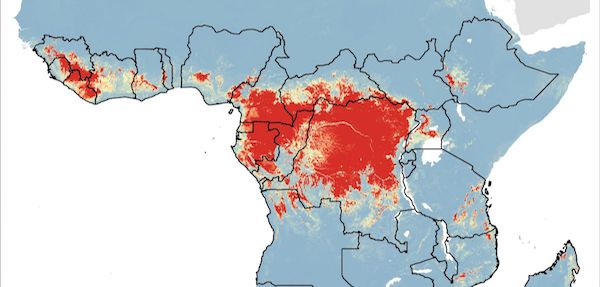
Now Ebola is back, and Africans are coming here, along with everyone else on earth who has heard about America’s worsened border laxity. I reported the other day about an apparently healthy Cameroonian man who had gotten as far as southern Mexico on his way here. There’s 1.3 billion more on the continent he came from, so don’t think only Hondurans are coming.
Tucker Carlson discussed the topic last week with Fox’s explainer doctor, Marc Siegel, who focused on the medical implications.

Tucker asked whether it is now even politically “possible to block people coming from any other country in the world” in the face of danger to the American people from a killer epidemic. It sounds like not so much.
This is where the politically correct view of America as Welfare Office for the World has brought us: if any human on earth (currently 7.7 billion persons) has a health problem or wants a better job, then the United States has to admit them.
]]>TUCKER CARLSON: In other developing news tonight, there are new fears that Ebola could be heading to this country. One of the worst outbreaks of that horrifying disease in history is underway tonight and spreading fast. A thousand people have already died of Ebola in the Congo. It’s one of the deadliest infectious diseases known to man, of course, fewer than one third of the people who display symptoms survive.
Just five years ago, there was a major outbreak of Ebola that made it to our country. How concerned should we be if at all this time around? For those answers, we go to the man, we always go to NYU medical professor, Dr. Marc Siegel joins us tonight. Doctor, thanks very much for coming on.
DR. MARC SIEGEL: Hi, Tucker.
CARLSON: So this seems like a development really in in the history of Ebola, a thousand people. Should we be concerned?
SIEGEL: Yes, we should. And I’ll tell you why, Tucker, because it’s in an area of the Democratic Republic of Congo, where there is not an infrastructure, where there is militia swarming around over 119 Ebola clinics — they have been attacked by militia. So it’s a security problem in addition to a health problem.
It’s also erupting right now. We’ve had over 100 cases in the past week alone. You said a thousand deaths out of 1,500 cases over the last year. One hundred in the past week alone.
The World Health Organization is in the middle of this, but they don’t have money. There’s not enough vaccines. Here’s a good development since 2016: we now have a highly effective vaccine. It’s been given to a hundred thousand people; that may sound like a lot. It needs to be given to millions. We don’t have the vaccines, and people are dying without even knowing they have Ebola.
Forty percent of the deaths, Ebola is identified after the person dies. It is erupting. It’s spreading. It’s getting out of control.
CARLSON: Interesting. But Ebola, at least, as it has been explained in the Western media, it seems like it would be kind of hard to miss. I mean, you hemorrhage from various orifices. I mean, it’s horrible. And people don’t know they have it?
SIEGEL: They don’t know they have it because there’s no one around there identifying it. There’s no healthcare workers in the region. World Health Organization — people have been killed. It’s not a situation — granted, someone that knows infectious diseases or even medicine is going to be able to identify it.
Now again, it’s going to spread to neighboring countries, I believe. Here’s one positive thing about it. It’s very hard to spread. You can only spread it if you come in contact with secretions, with blood. So it’s not spread casually.
So even if a traveler were to bring it here, which happened in 2014, with Craig Spencer and others, it will only spread if proper precautions are taken. If another case, God forbid shows up in the United States, hopefully they’ll isolate that case, it won’t spread here.
But there, it’s an enormous problem. People themselves don’t know what it is. They know they have some serious, horrible disease. They don’t know it’s Ebola.
CARLSON: It’s unbelievable. Ebola, of course, is far from the only deadly communicable disease floating around the globe. Do you think politically it would be possible to block people coming from any other country in the world? Could we actually do anything in the face of an epidemic at this point?
SIEGEL: What we usually do in a case like this is we bring more and more of our workers in rather than blocking travelers. But if it gets to the point where I said a hundred cases in the past week, we were considering that back in 2014, if it gets to the point where we start having thousands and thousands of cases and nothing is being done internally.
Now, the Democratic Republic of Congo is trying to help. Their Health Ministry is doing a lot. But again the militias and the security problem there, UN Forces are there, but nothing with what we need. This is becoming not just a health issue, but also an issue of having to bring in armies and a mess — a total, total mess and it’s not diminishing, it’s growing and it’s going to spread to neighboring countries in Africa.
CARLSON: I’m not surprised at all. Doctor, thanks very much for your perspective. Great to see you.
Now word has gotten out that America is back to being a soft touch, despite all Donald Trump’s tough talk that scared them off at first — [...]]]>
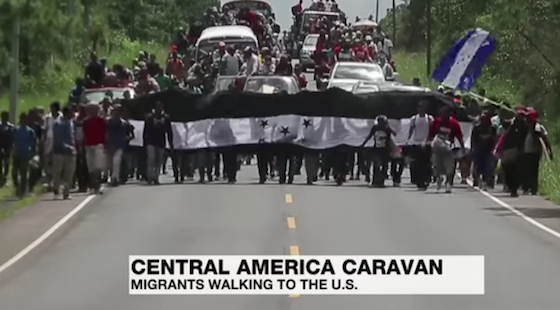
Now word has gotten out that America is back to being a soft touch, despite all Donald Trump’s tough talk that scared them off at first — there was a substantial drop in illegal border crossers in the first months of the Trump administration.
But as the news spreads of America’s border weakness, marauding job thieves are coming from around the world, illustrated very well by a Cameroonian man interviewed on Fox News on Tuesday.
REPORTER GRIFF JENKINS: I’m about 25 miles north of the Guatemala-Mexico border in the town of Tapachula; it’s been the stop for the caravans since they started coming. But one thing is very different and that is the word that our borders are open, that catch and release will let you stay in America, has gone global. We’ve run into migrants from Africa, from India, from Bangladesh, from Haiti, from Cuba. And we’ve only been here for about 24 hours.
We spoke to one gentleman, Saffa Sedhu (sp?) is his name, from Cameroon. Here is how he got here — this is unbelievable:
SAFFA SEDHU: I’m from Cameroon, and my journey started from Cameroon to Nigeria, from Nigeria to Turkey, from Turkey to Colombia, from Colombia to Panama, from Panama to Ecuador, from Ecuador I start coming by boats, I take by boat from Colombia to Capurgana. From Capurgana I had to walk in the jungle to Panama. When I arrived in Panama, I walk from camp to camp. I left Panama for Costa Rica. From Costa Rica to Nicaragua to Honduras, from Honduras to Guatemala, from Guatemala to Mexico now.
JENKINS: The goal is the same for all of them — to get to the US.
Now this, just to give you a quick shot, is the shelter where — remember the end of last week — 1300 migrants escaped from here because Mexico is detaining the migrants in these shelters. It’s overcrowded — if you look out here, these are the folks who couldn’t even get in, and they’re sleeping in the street. It’s obviously still late here, but the challenge now is that the makeup of these caravan flows is not just the Central Americans from Honduras, Guatemala, El Salvador, and to lesser extent, Nicaragua.
Now it’s just a mix of people from all over the planet and this is obviously why ICE, CBP and others are putting a lot of resources, more resources, on the border we’re learning to particularly combat that fake family unit. We’ve been talking to the immigration officials here to try and find out if they’re doing anything here in Mexico to try and expose fraudulent family units as well.
The Cameroonian who was interviewed (pictured below) appears to be a healthy, moderately intelligent young man — why isn’t he working at home to build his own country instead of mooching off America? Instead of being a patriot in his homeland, he spent a lot of time and money to be a thief in a foreign country where he is not wanted.

Multiply him by a million this year, and it’s not only a disaster for the US as we are increasingly seen as the world’s welfare office, but the Third World countries are being abandoned by their own people.
That’s no way to run a planet that has over 7.7 billion human residents today, with no sign of slowing down.
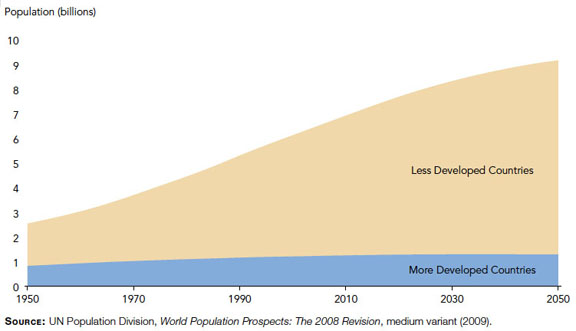
However, Africa’s industrial boomlet may be cut short by [...]]]>
However, Africa’s industrial boomlet may be cut short by cheaper automation in the United States:
US robots could increase migration of unemployed Africans, experts say, Yahoo Finance, January 25, 2019
Automation in US factories could increase global migration by wiping out employment opportunities in Africa, according to a development industry expert.
Sara Pantuliano, acting executive director of the Overseas Development Institute (ODI), told the Davos summit that unemployed Africans would be more likely to leave the continent if local manufacturing jobs dried up in the face of renewed US competition.
She highlighted recent ODI research which suggested operating robots in US factories could become cheaper than hiring Kenyan workers by 2033.
The cost of creating and using robots is expected to fall in wealthier countries, and could reach a tipping point where it becomes more efficient than using cheap labour in poorer countries.
On some manufacturing floors, human workers can be hard to find.

Potentially, the mass migrations of Africans to Europe in recent years might be dwarfed by future relocations if job opportunities dramatically shrink because of smart machines. Plus, a United Nations projection says the African population will reach 2.5 billion by 2050, one-quarter of humans on earth.
Of course, Africa won’t be the only underdeveloped region to be hit by automation; they will all be affected. In fact, it’s hard to imagine anything other than severe social disruption arising from areas where severe job loss occurs.
Author Martin Ford had a similar warning:
]]>Why Developing Countries Will Be Left Behind By Automation, By Martin Ford, ThriveGlobal.com, January 23, 2019
Two problems developing countries face in an AI future
Artificial Intelligence is likely to make a dramatic impact on developing countries that rely on lower wages to generate a competitive advantage. This will include countries that provide low cost offshore manufacturing as well as countries like India, which are more focused on service offshoring.
I delved deeply into the global impact on work in my 2015 book Rise of the Robots: Technology and the threat of a Jobless Future. I also discussed it in my new book, Architects of Intelligence, especially in the conversation with James Manyika, who is the chairman of the McKinsey Global Institute, which conducts important research in this area.
There are two problems developing countries face in an AI future:
1. Much of the work available in developing countries is relatively unskilled and routine, repetitive and predictable in nature. Work of this type is destined to be automated. This will be true in both developed and developing countries, but some economists believe the impact could be especially hard on poorer nations because a greater fraction of their workforce is engaged in work of this type.
2. The traditional path to economic development has been to build factories which employ large numbers of unskilled workers. As AI and robotics advance there will be less and less need for such labor-intensive factories (or for service offshoring) of this kind. Much of this production will end up being “reshored” to developed countries where it will be produced using highly automated facilities.
As this traditional path to economic growth begins to evaporate, this will pose a real challenge. In fact economists have already identified what they call “premature deindustrialization” in many developing countries — in other words, companies are replacing their factory workers with automation before they have the means to do so.
Naturally, these spots are a target for invasive Africans hoping to arrive in the freebie paradise on the mainland. Spain has [...]]]>

Naturally, these spots are a target for invasive Africans hoping to arrive in the freebie paradise on the mainland. Spain has unwisely been friendly to the aliens or, as Reuters reported in July, Spain emerges as EU’s new weak link for Africa migration.
Spain is seen by muslims as their territory because there was an Islamic presence there in the past. So some of the Africans who are muslims may well regard their illegal presence in Spain as a righteous jihad to reclaim Al Andalus for allah.
In fact, the process of re-Islamization is well underway in some communities, according to a 2012 report from Dale Hurd.
On Monday, the New York Times front-paged a story about the stresses on the little Spanish enclaves from illegal alien Africans seeking to mooch a better life in Europe.

That article was reprinted elsewhere, so click away to read the whole thing:
‘All of Africa Is Here’: Where Europe’s Southern Border Is Just a Fence, LiveNewsCity.com, August 19, 2018
CEUTA, Spain — For most migrants from Africa, the last stage of their trip to Europe involves some sort of perilous sea crossing. At the border in Ceuta, there is just a fence.
Ceuta (pronounced say-YOU-tah) is one of the two Spanish communities on the north coast of what otherwise would be Morocco, the only places where Europe has land borders with Africa. The other enclave is Melilla, farther east along the same coast.
Here, all that separates Europe from migrants is a double fence, 20 feet high and topped with barbed wire, stretching the four miles across the peninsula and dividing tiny Ceuta from Morocco — plus 1,100 Spanish federal police and Guardia Civil officers, a paramilitary police force.
They patrol a crossing point that has come under growing pressure.
After Italy’s new government closed the door to migrants, efforts to cross into Spain have more than quadrupled in 2018, making it the No. 1 European destination for migrants from Africa.
In the week ending Aug. 12, according to the International Organization for Migration, 1,419 migrants reached Spain, compared with 359 to Italy and 527 to Greece.
But the sea crossing to Spain, through the narrow straits of Gibraltar, is more dangerous than other passages, because of strong currents where the Mediterranean Sea meets the Atlantic.
Through June, 294 migrants drowned in the western Mediterranean, compared with 224 in all of 2017 in that area.
That has made trying to breach Ceuta’s heavily guarded fence an increasingly attractive proposition, a way to enter Spain without crossing the water. On any given day, young migrant men can be seen prowling on the Moroccan side, looking for an opportunity.
Some swim around the fences where they go down into the sea. Others take short, illicit boat trips from Morocco to Ceuta. But mostly they run and climb the fence, or use bolt-cutters to cut holes in it, where they are quickly spotted by motion detectors and guards in observation towers, and usually beaten back by policemen using sticks and fists.
Salif, 20, from Cameroon, said he tried 10 times to cross the fence in the past year, until he finally made it over on his 11th effort.
As often happens, successful tries are made by what locals call “mobbing,” when hundreds of migrants surge over the fence in a large group. Salif’s group came on June 6, when 400 young men began climbing the fence at sunrise.
Two were seriously injured on the barbed wire, and hospitalized in Ceuta. Eight, including Salif, managed to get over, and were then allowed to stay in a reception center in Ceuta, awaiting transfer to the mainland.
There, they can apply for asylum, a process that can take many months or even years. Most will be turned down, and the deportation process is slow and difficult.
While people often do get hurt trying to pierce the fence, deaths are rare.
“All of Africa is here,” said Salif, ticking off migrants he has met from Angola, Nigeria, Senegal, Burkina Faso, Ivory Coast, Benin — and even some from Pakistan and Bangladesh.
And they keep coming.
“Trying to stop migrants coming from Africa with a fence alone is as fanciful as the little Dutch boy who saves his country by putting his finger in a leaking dike,” said Leonard Doyle, the spokesman for the International Organization for Migration. (Continues)
Europe better figure out how to keep Africans out or else it will become a very different place for tomorrow’s generations.
